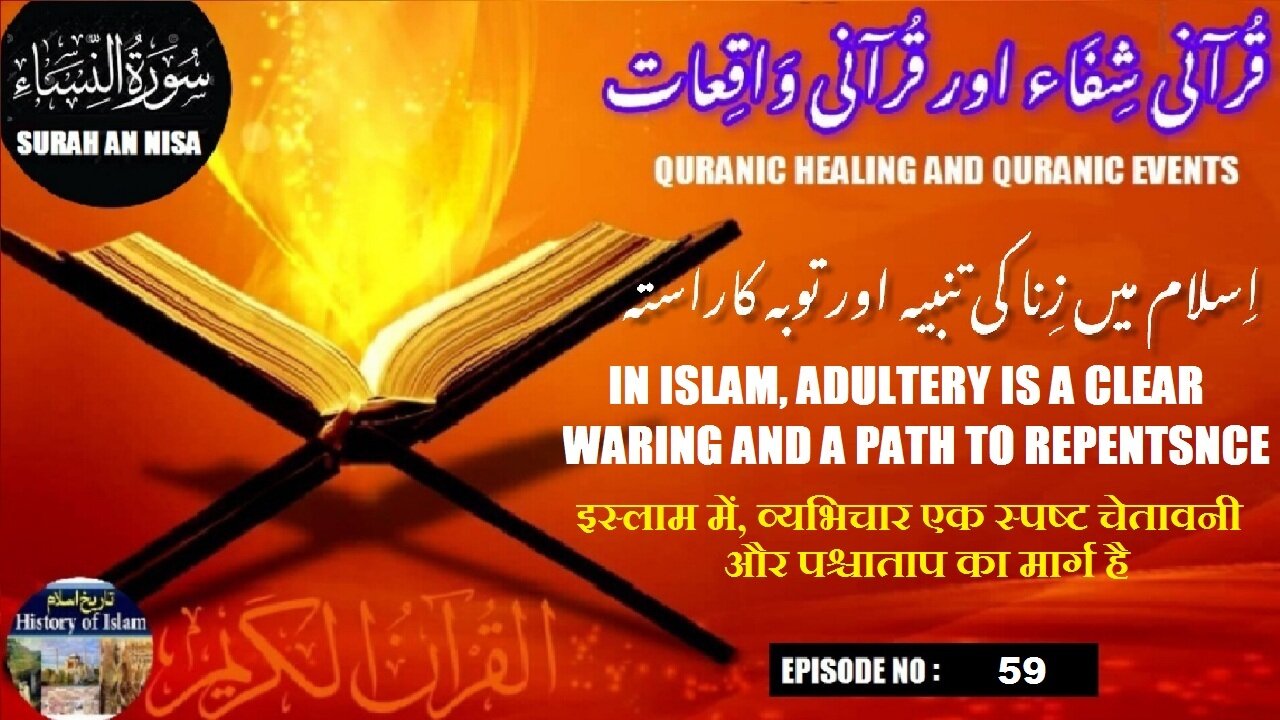Premium Only Content

In Islam, adultery warning and a path to repentance اسلام میں زنا واضح تنبیہ او ر توبہ کا راستہ
@islamichistory813 #zina #in #islam #qurans #clear #warning #the #path #to #repentance #healing #and #events #from #the #quran #historical #stories #and #events #quranicstories #selfhealing #success #stories #striking #events #in #history #quranstories, #storiesfromthequran #religious #creation #stories #trending #quran #short #historical #loves #historical #heroes #what #is #true #strength #calm #quran #recitation #for #babies #islamic #healing
Zina in Islam: Qur’an’s Clear Warning & the Path to Repentance (4:15–16)
Assalamu Alaikum, wa Rahmatullahi wa Barakatuhu.
Brothers, sisters, friends and elders, we are presenting the 59th episode of the Islamic informative video based on healing and events from the Holy Quran, and in this episode we will describe, Zina in Islam: Qur’an’s Clear Warning & the Path to Repentance (4:15–16)
Qur’anic Marriage and Family Laws: The Prohibition of Unlawful Sexual Behavior (Zina) in Surah An-Nisa 4:15–16
The Qur’anic approach to marriage and family is grounded in moral clarity, mutual respect, and social responsibility. A critical aspect of this moral framework is the strict prohibition of *zina* — unlawful sexual behavior — which the Qur’an addresses with gravity and wisdom. In Surah An-Nisa (4:15–16), Allah outlines the seriousness of such acts and introduces early procedural guidelines for addressing them in society. These verses, while brief, are foundational to Islamic sexual ethics and reflect the broader Islamic commitment to protecting the sanctity of marriage, personal dignity, and social order.
Surah An-Nisa 4:15 states: *“Those who commit unlawful sexual intercourse of your women –bring against them four [trustworthy] witnesses from among you. And if they testify, confine the guilty women to houses until death takes them or Allah ordains for them \[another] way.”* This verse was revealed in the early Madinan period and reflects the initial legal steps toward curbing immorality in a society transitioning from pre-Islamic permissiveness to Islamic ethics. It lays down the requirement of four reliable witnesses for such a serious accusation, thereby setting an extremely high evidentiary standard that serves as a deterrent against false allegations. The punishment mentioned — confinement — was a temporary disciplinary measure until further legal clarification was revealed, which came later in Surah An-Nur (24:2) with corporal punishment for proven cases.
The next verse, Surah An-Nisa 4:16, continues: *“And the two who commit it among you, punish them both. But if they repent and correct themselves, leave them alone. Indeed, Allah is ever Accepting of repentance and Merciful.”* This verse highlights a key principle in Qur’anic law: the possibility of sincere repentance and moral rehabilitation. Rather than promoting public shaming or irreversible punishment, Islam offers a path toward redemption for those who truly turn back to Allah and reform their behavior. The punishment in this verse is not specified in detail, and scholars have interpreted it in various ways — some seeing it as a form of social censure or temporary disciplinary action until a more detailed legal code was established.
The Qur’anic stance on zina is part of a wider ethical vision that seeks to protect the institution of marriage and the moral health of society. Islam views sexual relations as sacred and permissible only within the bounds of a lawful marriage. The family unit, being the core of human society, must be protected from the chaos and emotional damage that come from illicit sexual relationships. By strictly regulating sexual behavior, the Qur’an aims to ensure that family life is built on trust, legitimacy, and responsibility — not on fleeting desire or exploitation.
The strong condemnation of zina in these verses is also a powerful reminder of the value Islam places on personal honor and community stability. Zina does not only affect the individuals involved; it disrupts the social fabric, breaks trust, leads to potential issues of paternity, inheritance disputes, and emotional harm to families. Therefore, Islam does not treat sexual ethics as a private matter alone but as a communal concern requiring both prevention and justice.
It is also important to note that while zina is a major sin in Islam, the legal process to prove it is deliberately stringent. The requirement of four upright witnesses who saw the act itself makes it practically impossible to convict someone unless the offense is committed in extreme public disregard for morality. This high bar protects individuals from slander and abuse of legal systems, a recurring concern in the Qur’an. In fact, those who falsely accuse others of zina without providing four witnesses are themselves to be punished with eighty lashes and labeled as liars (Qur’an 24:4). This legal mechanism places great weight on personal dignity and the presumption of innocence.
Furthermore, the Qur’an emphasizes repentance. In 4:16, Allah says that if the individuals involved repent and reform, they should be left alone, for *“Allah is Oft-Forgiving, Most Merciful.”* This reveals the compassionate side of divine law. Islam does not abandon the sinner; instead, it invites them to reflect, seek forgiveness, and return to a life of virtue. This balance between strictness in prohibiting immoral acts and mercy in dealing with repentant individuals is a hallmark of Qur’anic guidance.
In conclusion, Surah An-Nisa 4:15–16 contributes significantly to the Qur’anic marriage and family laws by addressing unlawful sexual behavior with moral seriousness and procedural fairness. The verses promote the values of chastity, social responsibility, and repentance, while upholding the sanctity of marriage and the honor of individuals. These laws are not meant to control people’s lives harshly but to elevate human behavior to a standard that honors both divine guidance and societal wellbeing. They remind us that the path to a healthy society begins with personal integrity and collective moral consciousness.
With this, we ask for your permission until tomorrow and pray to Allah Almighty to grant us the ability to act on the Quran and Hadith, Amen
Allah Hafiz
============================
-
 12:22
12:22
ISLAMIC HISTORY
18 hours agoKhalid bin Walid (RA) Islamic Warrior Episode 63 خالد بن ولید رضی اللہ عنہ اسلامی جنگجو قسط نمبر
1 -
 LIVE
LIVE
SpartakusLIVE
6 hours agoI'M BACK || Quads w/ The Boys
643 watching -
 9:33
9:33
Ken LaCorte: Elephants in Rooms
9 hours ago $0.90 earnedWhy Do Black Men Love Big Butts?
12.8K5 -
 2:12
2:12
From Zero → Viral with AI
1 day ago $0.70 earned🚀 AI Marketing Isn’t Just for Big Brands Anymore — Here’s Why
17.8K4 -
 9:51:58
9:51:58
Dr Disrespect
13 hours ago🔴LIVE - DR DISRESPECT - 10 WINS ON CONTROLLER - BO7 TOMORROW
295K20 -
 1:24:56
1:24:56
Glenn Greenwald
7 hours agoTrump Declares Cities as the Enemies Within; Reagan Appointed Judge Slams Trump Over Speech Crackdowns; American ER Doctor on Gaza Atrocities | SYSTEM UPDATE #524
121K85 -
 LIVE
LIVE
I_Came_With_Fire_Podcast
13 hours agoPete Hegseth and the Chamber of Standards | Digital IDs | Taiwan Chips & Salsa | CDL Crisis
310 watching -
 2:01:46
2:01:46
Adam Does Movies
12 hours ago $0.26 earnedTalking Movies + Ask Me Anything - LIVE
14.9K -
 29:11
29:11
Nick Shirley
4 hours ago $2.62 earnedPortland has Fallen... ANTIFA Take Control of City
16.9K29 -
 1:19:00
1:19:00
VapinGamers
4 hours ago $0.74 earnedJump Space - We All Scream in Space - Early Access - !rumbot !music
16.1K1